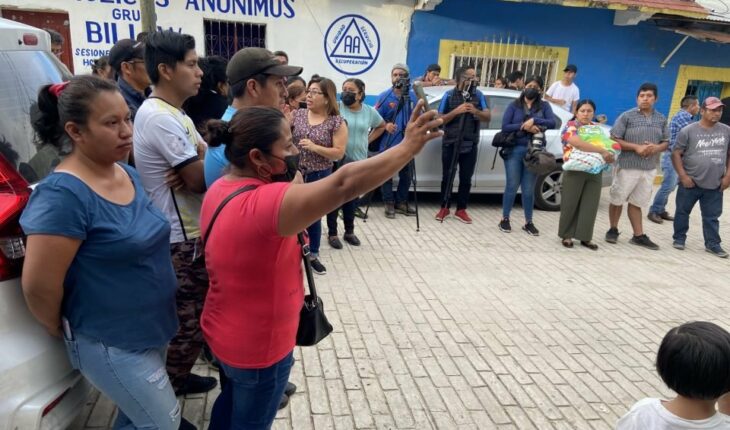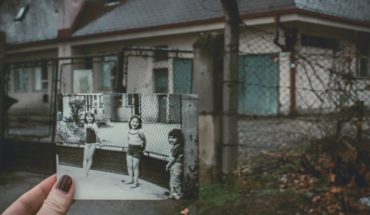“My sister is in the house and can’t be stopped. He hits himself (with his hands) and the doctor says they have nothing.” Alba, a short and brunette woman, describes the symptoms that her sister still suffers, after a week ago she and dozens of other students at Juana de Asbaje High School, in Bochil, Chiapas, were intoxicated.
Despite the time that has elapsed and the tests carried out so far, the local authorities still do not provide clear answers about what happened, while the families of the affected young people demand explanations and express concern.
About her sister, Alba details: “She has pain, they put diazepam intravenously, it is the only thing that calms her.”
But the young woman is not the only one who still suffers discomfort a week after the poisoning. Lourdes, the mother of another of the affected students, says that her son “continues with tachycardia, headache, agitation, upset stomach, vomiting and twice his nose bled.”
Another mother tells Political Animal that her daughter “twisted” and began to scratch, so the family transferred her to an IMSS hospital, where she was only given a tranquilizer.
“She has already left the hospital, but now that the lady (a woman whose daughter tested positive for cocaine) has arrived, she is telling me that they have the same symptoms,” he says.
The first case of poisoning was reported last Friday, October 7. The IMSS then reported that 57 adolescents had been affected. Days later, it was reported that three of them became intoxicated with cocaine and that authorities were testing the rest.
Olaf Gómez Hernández, attorney general of Chiapas, reported Thursday that in total there are 116 intoxicated students in different schools in the municipalities of Bochil and Tapachula. The official acknowledged that it is not yet known what caused the problem and there is no line of investigation.
Read more: In Chiapas, there are 116 intoxicated students; prosecutor rules out that they have ingested drugs but does not know what happened
Another of the inhabitants consulted says that, although his nephew is at home and not in a hospital, he does not have a good time. “He says right now his head, back, stomach hurts a lot and he still shakes like when you have that tic disease,” she says.
Exterior of the Juana de Asbaje high school.
“If it’s not cocaine, then what is it?”
Liliana, a short, thin, black-haired young woman, says a psychologist at the IMSS hospital said her sister, who was also intoxicated, is suffering from an anxiety crisis. “She was left with traumas, so she can’t hear anything because again her body starts to alter,” he says.
“When my sister remembers that day, she says she feels her head going round and round, there are things she doesn’t remember very well; therefore, the psychologist said that she could not give a statement because she is not in good condition.”
In this context, the relatives of the minors denounce that the authorities do not give them an explanation about why these symptoms continue and what happened.
In their search for answers, three of the affected families were able to afford a toxicology test in a particular laboratory and the results were positive for cocaine.
As a result, the Attorney General’s Office of Chiapas tested two of these young people and said their results were negative. He also did 54 other tests, of which 48 came back negative and six positive for benzodiazepine. Prosecutor Gomez Hernandez said this was “possibly because of the treatments that adolescents have received in the hospitals that have treated them.”
The parents doubt this information, as they denounce that the authorities never gave them any evidence of the evidence.
Faced with the unknown that plagues Bochil, a municipality of more than 37,000 inhabitants located in the north of Chiapas, two mothers proposed to request blood tests from young people, but in private laboratories located outside the town.
They say bochil’s clinical establishments have refused to treat their cases. “Maybe they’ve been bullied,” says one of them.
“Not even in the hospital do they know what to do; if it’s not cocaine, then what is? What we want is a people without drugs,” says Lucia, another woman, who laments that her son is still very weak and sad.
Parents demand and demand answers.
Authorities perform tests without showing the results
Liliana’s sister has been admitted to the IMSS hospital three times. He has had two tests, one blood and one urine. The first was a day after having entered the place, the next was the fourth day of the events. But in both cases, he claims he has no evidence of the outcome.
Mr. Luis says that his grandson the authorities he had two separate urine tests after he was admitted to the hospital, but none showed him whether he tested positive or negative for drugs. According to the doctors, it came out negative.
A week after the events, Alicia, another mother, says that after five days of intoxication she took her son to be tested for drugs in a private laboratory in Tuxtla Gutiérrez, the state capital. There, the result was positive.
“Meanwhile,” says Mr. Luis, “we give my little grandson who is at home twice a day lemon juice and a Coca-Cola so that he can recover from the desire to vomit, which they give him at times, because the authorities have not told us what happened.”
Like him, dozens of mothers, fathers and relatives are still waiting for answers and feel anguish about the discomforts that their adolescents still suffer.
What we do at Animal Político requires professional journalists, teamwork, dialogue with readers and something very important: independence. You can help us keep going. Be part of the team.
Subscribe to Animal Político, receive benefits and support free journalism.#YoSoyAnimal





